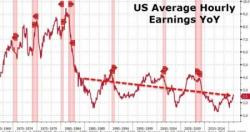A Bubble Induced Economy & The Wage Gap

Submitted by Leonard Brecken via OilPrice.com,
During the 1990s, developing nations including Mexico and many in Asia became very competitive manufacturing bases due to lower wage structures. This, I believe, was the root cause of the use of failed fiscal and monetary policy to “close the gap” with the competitiveness of low-cost wage structures around the world, which has played out for three decades. The result has been three bubbles and a worsening systemic problem of wage and taxation disparity between the U.S. and developing nations.

